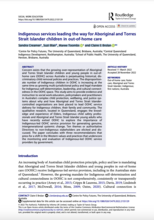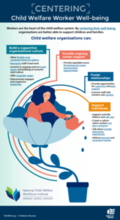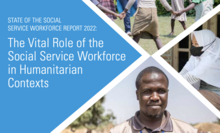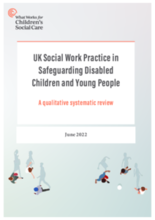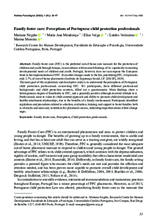Displaying 31 - 40 of 477
This study aims to provide evidence and instruction to social work educators, policymakers and practitioners
in Australia’s child protection, wellbeing, and justice systems about why and how Aboriginal and Torres Strait Islander controlled organizations are best placed to lead out-of-home care service delivery for Indigenous children, their family and community.
The social service workforce plays an important role within social protection systems by connecting children, individuals, and families with a range of social services across sectors. Despite the increasing challenge of poverty and vulnerability exacerbated by the COVID-19 pandemic, conflict and climate change, as well as the increasing recognition of the role of social service workers, investments in strengthening the workforce remain low across most countries. This presentation aims to clarify the role of the social service workforce in the social protection system. It also outlines key considerations for strengthening the social service workforce in their integral role in delivering effective and efficient social protection programmes and services.
This guide is intended to inform policy makers and workforce managers in ministries of social welfare, finance and planning, and, where applicable, provincial or district authorities and other relevant national bodies responsible for the recruitment, deployment, funding or regulation of the social service workforce. The guide can also be used by a national level leadership group tasked with defining an adequate level of resourcing for social services, and, on this basis, a minimum ratio of workforce to population, alongside other steps to strengthen the social service workforce.
The Eastern and Southern Africa Regional Learning Platform hosted a webinar on September 20, 2022, with panel of experts who explored how the social service workforce can be strengthened to support care reform in Eastern and Southern Africa.
This paper concentrates on the discussion of some contextual issues along with the challenges that are closely associated with social work practice at Macro, Mezzo and Micro levels of intervention. Here in the paper, theoretical approaches and techniques that are significantly applicable in social work practice have been presented along with some challenge-related contexts in social work practice in Bangladesh.
This paper aims to enable policy makers, civil society and advocacy groups to better articulate the value of the social service workforce in health systems through a presentation of the latest evidence on social service workforce roles, functions and promising practice models, and related influence on health outcomes and costs. Based on interviews, research and data from a range of countries, it outlines key challenges, opportunities and recommendations around effective and sustained deployment of the social service workforce when located in or linked to health facilities.
This infographic describes how child welfare organizations can center child welfare worker well-being to better support children and families.
Drawing from a review of global reports and case studies, as well as from information sourced from Global Social Service Workforce Alliance members, this report brings to light the critical role of the social service workforce in different humanitarian contexts—including those related to armed conflict, natural disasters and widespread disease outbreaks—and across the emergency management cycle. It further highlights the challenges and key areas of learning in deploying social service workers in humanitarian contexts.
This study aimed to synthesize existing qualitative UK evidence on the known safeguarding risks and poorer outcomes for disabled children and young people who are at risk of, or who have experienced abuse. This study focused on research, which had sought the views of disabled children and young people, parents/carers and practitioners.
The main goal of this exploratory and descriptive study is to understand the perceptions of Portuguese child protection professionals concerning Family foster care. 101 participants, from different professional backgrounds and child protection contexts, filled out a questionnaire. Main findings show a heterogeneous degree of familiarity to FFC, and a generally positive although reserved attitude to it.

